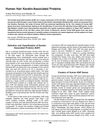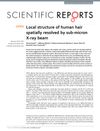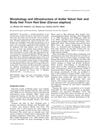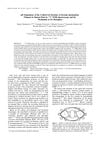186 citations,
December 2012 in “Current opinion in cell biology” Keratin proteins are increasingly recognized as important for cell health and are linked to many diseases.
38 citations,
November 2020 in “International journal of biochemistry & cell biology” Keratin proteins are essential for keeping the cells in the human colon healthy and stable.
15 citations,
January 2018 in “Advances in experimental medicine and biology” Keratin proteins are crucial for hair growth and structure.
 211 citations,
April 2018 in “Cold Spring Harbor Perspectives in Biology”
211 citations,
April 2018 in “Cold Spring Harbor Perspectives in Biology” Keratins are crucial for cell structure, growth, and disease risk.
91 citations,
December 2000 in “The journal of cell biology/The Journal of cell biology” Scientists successfully created mouse hair proteins in the lab, which are stable and similar to natural hair.
12 citations,
September 2013 in “BMC Biophysics” Keratin filaments' elasticity is influenced by their terminal domains and surrounding medium.
27 citations,
November 2007 in “Genomics” Mutations in specific keratin genes cause improper hair structure in mice due to faulty keratin protein assembly.
 71 citations,
August 2005 in “The journal of investigative dermatology. Symposium proceedings/The Journal of investigative dermatology symposium proceedings”
71 citations,
August 2005 in “The journal of investigative dermatology. Symposium proceedings/The Journal of investigative dermatology symposium proceedings” Hair keratin-associated proteins are essential for strong hair, with over 80 genes showing specific patterns and variations among people.
 41 citations,
November 2020 in “Colloids and surfaces. B, Biointerfaces”
41 citations,
November 2020 in “Colloids and surfaces. B, Biointerfaces” Different hair protein amounts change the strength of keratin/chitosan gels, useful for making predictable tissue engineering materials.
 1 citations,
June 2023 in “International journal of biological macromolecules”
1 citations,
June 2023 in “International journal of biological macromolecules” Human hair proteins can help blood clot when mixed in equal parts.
 November 2023 in “Journal of the Taiwan Institute of Chemical Engineers”
November 2023 in “Journal of the Taiwan Institute of Chemical Engineers” Scientists made nanoparticles from human hair proteins to improve drug delivery.
 24 citations,
November 2015 in “Scientific reports”
24 citations,
November 2015 in “Scientific reports” Human hair has a new region with ordered filaments and the cuticle contains β-keratin sheets.
69 citations,
January 2015 in “Cell & tissue research/Cell and tissue research” Keratin mutations cause skin diseases and could lead to new treatments.
53 citations,
September 2004 in “American journal of medical genetics. Part C, Seminars in medical genetics” Mutations in keratin genes cause cell fragility and various skin disorders.
13 citations,
May 2001 in “Current problems in dermatology” Keratin proteins in epithelial cells are dynamic and crucial for cell processes and disease understanding.
108 citations,
October 2003 in “Journal of biological chemistry/The Journal of biological chemistry” Trichohyalin makes hair follicles stronger.
 48 citations,
July 1993 in “The journal of investigative dermatology/Journal of investigative dermatology”
48 citations,
July 1993 in “The journal of investigative dermatology/Journal of investigative dermatology” Hair growth is controlled by specific gene clusters and proteins, and cysteine affects hair gene expression in sheep.
6 citations,
February 2021 in “Proteins” Researchers found that the most reachable bonds in wool fibers are near the ends of certain proteins, which help stabilize the fiber's structure.
Oxidized hair can naturally regain strength and stability over six months.
 87 citations,
July 2009 in “The journal of investigative dermatology/Journal of investigative dermatology”
87 citations,
July 2009 in “The journal of investigative dermatology/Journal of investigative dermatology” Human beard hair medulla contains a unique and complex mix of keratins not found in other human tissues.
37 citations,
October 2015 in “PeerJ” Perming significantly changes hair's molecular structure, while shampoo and conditioner do not.
 18 citations,
November 2010 in “Journal of morphology”
18 citations,
November 2010 in “Journal of morphology” Antler velvet hair and body hair of red deer have different structures that help with protection and insulation.
 12 citations,
January 2014 in “Cell structure and function”
12 citations,
January 2014 in “Cell structure and function” Different combinations of human hair keratins affect how hair fibers form.
 4 citations,
September 2019 in “Biomedical Papers/Biomedical Papers of the Faculty of Medicine of Palacký University, Olomouc Czech Republic”
4 citations,
September 2019 in “Biomedical Papers/Biomedical Papers of the Faculty of Medicine of Palacký University, Olomouc Czech Republic” CD2 might be a new treatment target for patchy alopecia areata.

Human hair keratins can self-assemble and support cell growth, useful for biomedical applications.
 19 citations,
January 2009 in “International review of cell and molecular biology”
19 citations,
January 2009 in “International review of cell and molecular biology” Hair's strength and flexibility come from its protein structure and molecular interactions.
 54 citations,
November 2015 in “Methods in enzymology on CD-ROM/Methods in enzymology”
54 citations,
November 2015 in “Methods in enzymology on CD-ROM/Methods in enzymology” Keratins are important for skin cell health and their problems can cause diseases.
19 citations,
May 2008 in “Applied spectroscopy” Human hair has different protein structures in its cuticle and cortex.
 7 citations,
February 1998 in “Polymer journal”
7 citations,
February 1998 in “Polymer journal” Keratin structure in hair is stable at pH 5-6 but disrupts between pH 6-7.
9 citations,
November 2020 in “The FASEB journal” Intermediate filaments are crucial for cell differentiation and stem cell function.














